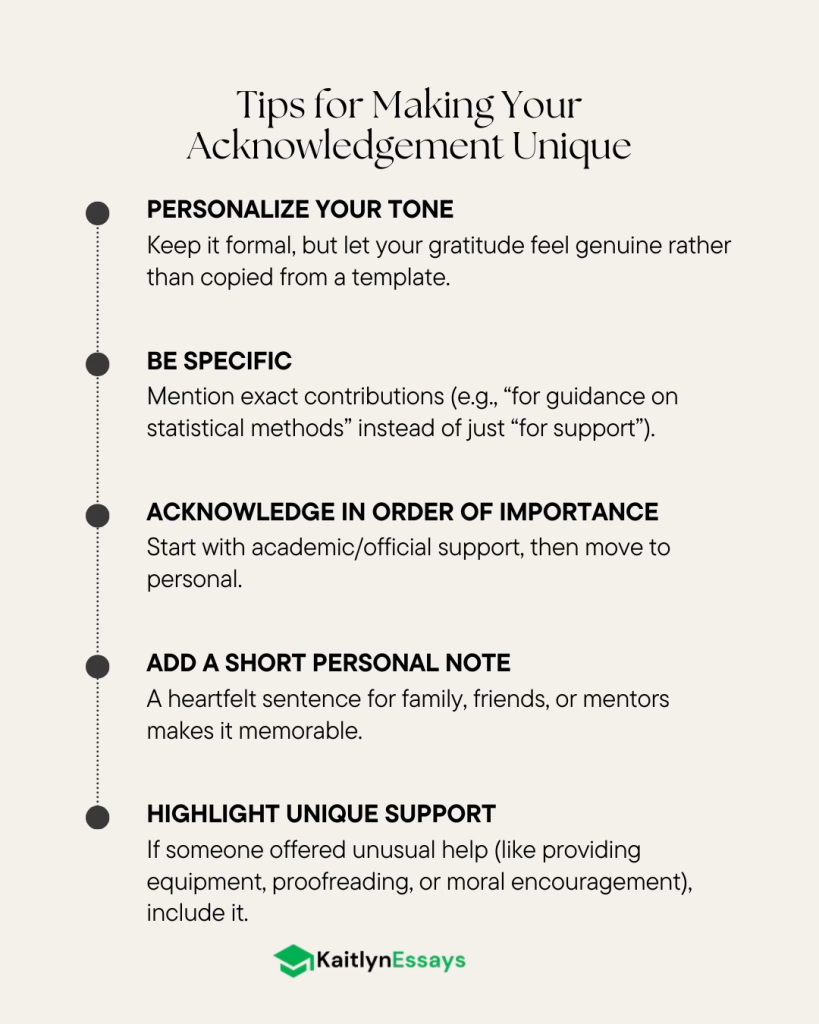
The acknowledgement section of a thesis is one of the most personal yet structured components of academic writing. This often-overlooked element serves as a bridge between the formal academic discourse and the human relationships that made the research possible. While thesis writers frequently struggle with how to appropriately recognize the various individuals and institutions that contributed to their scholarly journey, understanding the proper format and conventions can transform this challenge into an opportunity for meaningful expression.
A well-written acknowledgement section follows specific academic protocols while maintaining authenticity and warmth. It requires careful consideration of hierarchy, appropriate tone, and comprehensive recognition of all significant contributors. From supervisors and committee members to family, friends, and funding organizations, each category of support demands thoughtful attention and proper placement within the overall structure.
What is an acknowledgement in a Thesis?
An acknowledgement in a thesis is a dedicated section where the author formally recognizes and expresses gratitude to the people, institutions, and organizations that provided support, guidance, or resources during the research and writing process. This section typically appears early in the thesis, usually after the abstract and before the table of contents.
The acknowledgement serves several important purposes:
Recognition of Support: It honors supervisors, advisors, committee members, and other academic mentors who provided intellectual guidance, feedback, and direction throughout the research journey.
Professional Courtesy: It acknowledges institutional support such as universities, research centers, libraries, laboratories, and funding bodies (grants, scholarships, fellowships) that made the research financially and logistically possible.
Personal Gratitude: It thanks family members, friends, colleagues, and peers who provided emotional support, encouragement, or practical assistance during the often challenging thesis writing process.
Ethical Responsibility: It ensures proper recognition of those who contributed to the work, maintaining academic integrity and transparency about the collaborative nature of research.
Professional Networking: It demonstrates the author’s ability to build and maintain professional relationships within their academic community.
Importance of Acknowledgements
Acknowledgements hold significant importance in academic writing, serving multiple crucial functions that extend beyond mere courtesy:
Academic Integrity and Transparency Acknowledgements ensure honest representation of the research process by recognizing all forms of assistance received. This transparency maintains ethical standards and demonstrates that scholarly work rarely occurs in isolation, helping to build trust between the author and academic community.
Professional Relationship Building By formally recognizing mentors, colleagues, and institutions, acknowledgements strengthen professional networks and foster ongoing collaborative relationships. This recognition can open doors for future research opportunities, partnerships, and career advancement.
Institutional Recognition Acknowledging funding bodies, universities, and research institutions fulfills contractual obligations and maintains positive relationships with these entities. This recognition often influences future funding decisions and institutional support.
Historical Documentation Acknowledgements create a permanent record of the support system behind the research, providing valuable context for future scholars studying the development of ideas and academic lineages within specific fields.
Personal and Emotional Significance The thesis journey is often lengthy and challenging. Acknowledgements provide closure and emotional satisfaction by formally recognizing the personal sacrifices and support of family and friends who sustained the author through difficult periods.
Setting Professional Standards Well-written acknowledgements demonstrate the author’s professionalism, attention to detail, and understanding of academic conventions, qualities that reflect positively on their scholarly maturity and career readiness.
General Format of a Thesis Acknowledgement
Heading and Placement The acknowledgement section typically appears as a separate page with “Acknowledgements” or “Acknowledgments” (both spellings are acceptable) centered at the top. It’s usually positioned after the abstract and before the table of contents.
Opening Statement Begin with a formal yet personal opening that establishes the tone, such as “I would like to express my sincere gratitude…” or “I wish to acknowledge the invaluable support…”
Hierarchical Order of Recognition Follow this typical sequence:
- Primary Academic Supervisors – Thesis advisor(s) and committee chair, acknowledging their guidance, expertise, and mentorship
- Committee Members – Individual recognition of each committee member’s contributions
- Institutional Support – University, department, research centers, libraries, and administrative staff
- Funding Sources – Grants, scholarships, fellowships, and sponsoring organizations
- Professional Colleagues – Research collaborators, laboratory staff, interview participants, and peer reviewers
- Personal Support – Family, friends, and personal relationships that provided emotional support
Tone and Style Maintain a balance between formal academic language and heartfelt appreciation. Use first person (“I”) and present the acknowledgements in paragraph form rather than bullet points.
Length and Specificity Keep acknowledgements concise (typically 1-2 pages) while being specific about contributions. Avoid generic statements and instead highlight particular ways each person or institution helped.
Closing End with a statement taking responsibility for any errors or limitations in the work.
Structure of a Thesis Acknowledgement
Header Section
- Page title: “Acknowledgements” or “Acknowledgments” (centered, bold)
- Positioned on a separate page with proper margins
- Page numbering consistent with preliminary pages (usually lowercase Roman numerals)
Opening Paragraph Begin with a formal introductory statement that sets the grateful tone:
- “I would like to express my heartfelt gratitude…”
- “It is with deep appreciation that I acknowledge…”
- “This thesis would not have been possible without…”
Tier 1: Academic Supervisors and Mentors
- Primary thesis advisor/supervisor: First and most detailed recognition
- Co-supervisors or co-advisors: If applicable
- Thesis committee members: Individual acknowledgement of each member
- Specify their particular contributions (guidance, expertise, feedback)
Tier 2: Academic and Professional Support
- Department faculty: Professors who provided coursework foundation
- Research collaborators: Co-researchers, lab partners, or field assistants
- External experts: Industry professionals or specialists consulted
- Peer reviewers: Fellow graduate students who provided feedback
Tier 3: Institutional Recognition
- University and department: Institutional affiliation and resources
- Research facilities: Libraries, laboratories, computer centers
- Administrative staff: Department secretaries, registrar, IT support
- Technical support: Research assistants, data analysts, editors
Tier 4: Financial Support
- Primary funding sources: Major grants, fellowships, or scholarships
- Secondary funding: Travel grants, conference funding, research stipends
- Institutional funding: Teaching assistantships, research assistantships
Tier 5: Data and Participant Acknowledgement
- Research participants: Interview subjects, survey respondents
- Organizations: Companies or institutions that provided data access
- Fieldwork contacts: Local guides, translators, or facilitators
Tier 6: Personal Support System
- Family members: Spouse, parents, children, siblings
- Close friends: Long-term emotional and practical support
- Personal mentors: Non-academic advisors or life coaches
Closing Statement End with a responsibility statement:
- “Any errors or omissions remain entirely my own”
- “While many have contributed to this work, I alone am responsible for its limitations”
Formatting Guidelines
- Single-spaced or 1.5-spaced text
- Justified or left-aligned paragraphs
- Consistent font with the rest of the thesis
- Typically 1-3 pages in length
- Professional yet warm tone throughout

Sample Acknowledgement Formats
Example 1: Formal Acknowledgement
ACKNOWLEDGEMENTS
I wish to express my sincere gratitude to all those who contributed to the completion of this dissertation. First and foremost, I extend my deepest appreciation to my thesis supervisor, Dr. Margaret Thompson, whose scholarly guidance, rigorous feedback, and unwavering commitment to academic excellence provided the foundation for this research. Her expertise in environmental policy and methodological rigor significantly enhanced the quality of this work.
I am grateful to my thesis committee members, Dr. Robert Chen and Dr. Sarah Williams, for their valuable insights, constructive criticism, and thoughtful recommendations that strengthened both the theoretical framework and empirical analysis presented herein.
I acknowledge the financial support provided by the National Science Foundation Graduate Research Fellowship (Grant No. DGE-2023456) and the University Research Council, which made this research financially viable. The Department of Environmental Studies provided essential resources, including access to specialized databases and laboratory facilities.
I extend my appreciation to the 127 survey participants and 15 interview subjects who generously shared their time and perspectives, making the empirical component of this study possible. Additionally, I thank the Environmental Protection Agency for granting access to their archived datasets.
Technical assistance from the University Statistical Consulting Center, particularly Dr. James Liu’s guidance on multivariate analysis, proved invaluable to this research.
Finally, I acknowledge my family for their patience and understanding throughout this academic endeavor. Any errors or limitations in this work remain entirely my responsibility.
Example 2: Personal Yet Professional Acknowledgement
ACKNOWLEDGEMENTS
This dissertation represents not just my individual effort, but the collective support of many remarkable people who believed in this project and in me.
My deepest gratitude goes to my advisor, Dr. Elena Rodriguez, who saw potential in my scattered initial ideas and helped me shape them into something meaningful. Elena, your door was always open, your feedback was always thoughtful, and your encouragement came exactly when I needed it most. You taught me not just how to research, but how to think like a scholar.
To my committee members, Dr. Michael Kim and Dr. Jennifer Adams: Michael, your challenging questions pushed me to dig deeper into the theoretical foundations of my work. Jennifer, your practical insights helped me understand the real-world implications of my findings. Both of you made this thesis stronger.
The Graduate School Fellowship and the Dissertation Completion Grant provided crucial financial support that allowed me to focus entirely on writing during my final year. I’m also grateful to the staff at the International Development Research Centre, who welcomed me during my fieldwork and shared their expertise generously.
To my fellow graduate students in the Thursday writing group: Sarah, David, and Maria—you kept me sane and motivated through the long months of drafting and revision. Our shared struggles and celebrations made this journey less lonely.
My family deserves special recognition. Mom and Dad, you never stopped believing I could finish, even when I doubted myself. To my partner, Alex, who celebrated every small milestone and provided comfort during the inevitable setbacks—this would not have been possible without your love and patience.
While this work bears my name, it truly belongs to all of us. Any remaining shortcomings are, of course, my own.
Example 3: Brief Acknowledgement
ACKNOWLEDGEMENTS
I gratefully acknowledge the essential contributions that made this thesis possible.
My sincere thanks to Dr. Patricia Moore, my thesis supervisor, for her expert guidance and continuous support throughout this research. I also thank my committee members, Dr. Alan Foster and Dr. Catherine Liu, for their valuable feedback and insights.
This research was supported by the National Research Council Graduate Fellowship and the Department of Psychology Research Fund. I appreciate the University Library staff for their assistance with database access and interlibrary loan services.
Special thanks to the 89 participants who volunteered for this study and to Dr. Susan Park for her statistical consulting expertise.
Finally, I thank my family and friends for their encouragement and understanding during this challenging but rewarding process.
Any errors in this work remain my sole responsibility.
FAQs
What is an example of dedication and acknowledgement in a thesis?
Dedication Example:
“This thesis is dedicated to my parents, whose unwavering love and support have been my greatest source of strength.”
Acknowledgement Example:
“I am sincerely grateful to my advisor, Prof. Johnson, for her mentorship and valuable feedback. I also extend my appreciation to my colleagues for their assistance and to my family for their encouragement.”
How do I start my acknowledgement?
Start with a general expression of gratitude, usually to your supervisor or advisor. For example:
“First and foremost, I would like to express my sincere gratitude to my supervisor, Dr. Brown, for his continuous guidance and support throughout this research.”
What are some common mistakes in acknowledgements?
Being overly casual or emotional.
Forgetting to mention key contributors.
Writing acknowledgements that are too long.
Using clichés and repetitive phrases.
Including jokes or inappropriate humor.
Should I thank everyone in my acknowledgement?
No, you don’t need to thank every single person. Focus on those who had a significant impact—academic mentors, institutions, and close supporters. Too many names can make it cluttered.
